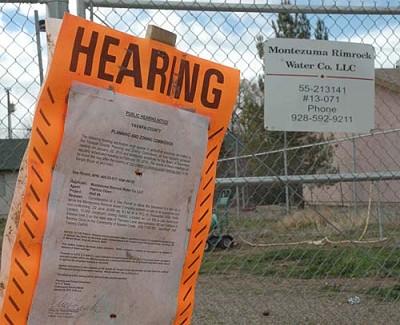
Rimrock well mired in regulatory mess
Steve Ayers
RIMROCK - The Montezuma Rimrock Water Company, owner of a proposed commercial well outside the gates of Montezuma Well National Monument, was dealt another setback on Tuesday when the Arizona Corporation Commission refused to extend a deadline for its arsenic abatement project.

VVN/Steve Ayers
A long list of regulatory violations, followed by a ruling this week from the Arizona Corporation Commission, are limiting the options of the Montezuma Rimrock Water Company to bring their beleaguered and arsenic-tainted system in line with federal standards.
The company has been in violation of federal arsenic standards since Jan. 23, 2006, the initial deadline imposed by the Environmental Protection Agency for water providers nationwide.
On Dec. 17, 2008, the Arizona Department of Environmental Quality issued MRWC a Notice of Violation for distributing water over the maximum allowable level of arsenic.
A Notice of Violation is an informal tool used by ADEQ to inform companies or governmental agencies that ADEQ believes a problem exists.
According to previous statements issued by MRWC, their original plan to install reverse osmosis systems in every home in their service area was scrapped due to the increase in the number of residences being served by the system.
The company instead proposed the construction of a centralized arsenic treatment system, which required, along with the unit that treats the water, an additional well.
It is that well that has drawn criticism from area residents because of its depth, pumping capacity and proximity to the national monument.
In October 2009 MRWC received approval from the Arizona Corporation Commission for a rate adjustment to cover the costs of an arsenic treatment system. They also received approval to incur debt in the form of a low-interest loan from the state's Water Infrastructure Finance Authority.
As part of the commission's approval, the company was given until April 30, 2010 to receive an Approval of Constriction from ADEQ, a document that effectively state's the company has an arsenic system built to standards, in place and ready to operate.
On Oct. 21, 2009, after failing to adequately address the informal Notice of Violation, MRWC received a Consent Order, a more formal demand from ADEQ that the company set a timetable for compliance with arsenic standards.
MRWC has refused to sign the consent order, stating through their attorney that ADEQ's demand that they provide an alternate source of water drinking water is an "extremely onerous obligation" and "would cripple [MRWC] financially."
In response, Vivian Burns, enforcement manager for ADEQ, notified owner Patricia Olsen that the company had almost nine years to comply with arsenic standards and that the demand for an alternate source of drinking water would stay in place.
In December 2009, Olsen received approval from WIFA for a $165,000 loan. However, in February 2010, WIFA suspended approval of the loan after a citizen complaint raised questions about the well's impact on nearby Montezuma Well and the Beaver Creek riparian area.
WIFA is now requiring that MRWC first provide an Environmental Information Document (EID), a report outlining what effects if any the arsenic project, including the well, would have on the surrounding environment.
The information needed to back up the EID may require a costly and time-consuming study, which in light of the latest regulatory move by ADEQ will, make matters more difficult for MRWC.
Last Friday, ADEQ issued the water company a Compliance Order. Compliance Orders demand specific things be done within a specific timeframe, or the violator could face administrative fines.
If MRWC doesn't appeal the order, the timetable for compliance will begin on March 28.
Among the demands are that MRWC begin providing drinking water to their customers, within 10 days, in the form of bottled water or "other methods."
Within 15 days they must also apply for a permit to construct the arsenic system, and within 30 days after receiving that Approval to Construct, they must apply for an Approval of Construction, the same document the Corporation Commission wanted by April 30.
At the Corporation Commission hearing on Tuesday, MRWC asked for an extension of their deadline for providing the Approval of Construction permit to the commission.
Instead, exasperated commissioners did just the opposite -- they rolled the deadline back to last December, effectively placing MRWC in immediate violation of the commission's order issued in October.
The Commissioners also told Olsen they were not interested in allowing her to seek private financing for the project, which would have allowed MRWC to avoid the environmental assessment required by WIFA, and, in the long run, cost rate payers more for the higher interest loan.
The commission's order sets the stage for several possible sanctions against the company, perhaps the most severe being the removal of the current company management, or forcing the sale of the company's assets.
Before Olsen purchased the company in July 2005, the staff of the Corporation Commission, after reviewing her financial assets and considering the need for immediate and expensive arsenic abatement, recommended selling the water system to the Arizona Water Company.
According to Corporation Commission spokesperson Rebecca Wilder, it will now be up to the commission staff to make further recommendations on the company's fate. No date has been set for those recommendations to go before the commission.
campverdebugleonline.com/main.asp
March 4, 2010
